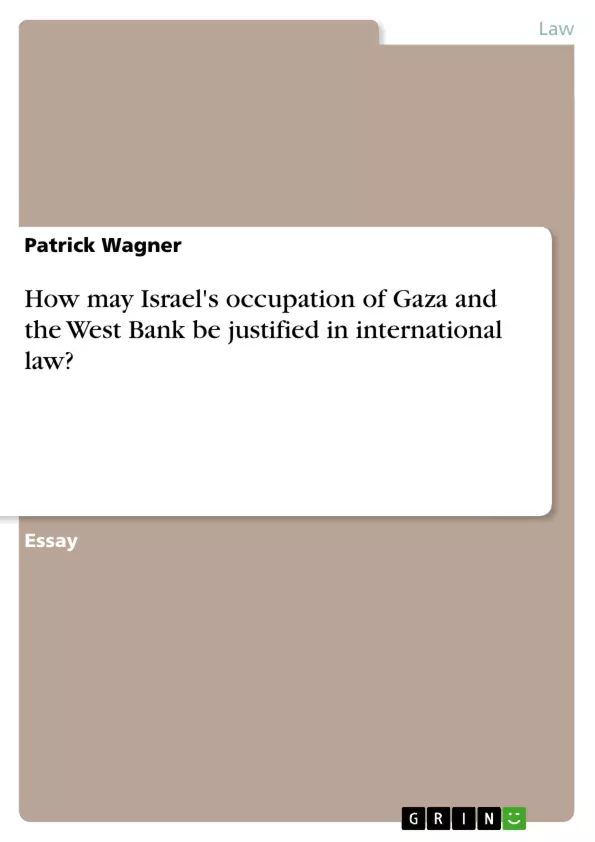The conflict between Israel and the Palestinians over the occupation of the West Bank and Gaza is one of the most complicated conflicts in the world. Attempts to resolve the conflict have failed in the past and a resolution seems unlikely to emerge in the near future. Partly, this is due to the fact that the situation is extremely complex and the conflict very old. History, politics and international law together with religion, nationalism and pride are entangled to form this conflict. For both sides the conflict has reached an emotional level where belief is more important than rational decisions.
A lot has been written about the Israel-Palestine conflict and in recent years more and more critique of Israel has emerged. This is particularly interesting as usually every criticism of its actions or policies is turned down by Israel as anti-Semitism. One thus has to be extremely careful when writing about Israel although international law seems to be relatively clear about the 1967 occupation of Gaza and the West Bank.
In order to examine the legality of the occupation, this paper will discuss the situation from both angles and look at the sources of international law relevant to this case. These are the Charter of the United Nations in general and the United Nations Security Council Resolution 242 in particular. In addition, customary international law has developed to a jus cogens, prohibiting the use of force at all for settling international disputes.
Finally, this paper shall conclude that any justification of the occupation is doubtful and there is little evidence in international law that might legitimise Israel’s actions. And even if the initial occupation could be legitimised under Article 51 of the UN Charter as an act of self-defence, the prolonged occupation would still lack any legal basis.
Inhaltsverzeichnis (Table of Contents)
- How may Israel's occupation of Gaza and the West Bank be justified in international law?
- The Israeli Perspective
- The Palestinian Perspective
Zielsetzung und Themenschwerpunkte (Objectives and Key Themes)
This essay examines the legality of Israel's occupation of Gaza and the West Bank, analyzing arguments from both Israeli and Palestinian perspectives. It explores the relevant sources of international law, including the UN Charter and customary international law, to evaluate the justifications for the occupation.
- The legality of Israel's 1967 occupation of Gaza and the West Bank under international law
- The applicability of the right to self-defense under Article 51 of the UN Charter
- The impact of customary international law and the prohibition of the use of force
- The role of security concerns and territorial advancements in justifying the occupation
- The implications of the prolonged occupation and its impact on the conflict.
Zusammenfassung der Kapitel (Chapter Summaries)
- The essay begins by outlining the complexity of the Israel-Palestine conflict and its historical, political, and legal dimensions. It emphasizes the emotional nature of the debate and the importance of understanding the conflict's historical context and the perspectives of both sides.
- The Israeli perspective on the occupation is then presented, arguing that it was a legitimate act of self-defense in 1967 and necessary for Israel's security. The essay examines Israel's claims based on Article 51 of the UN Charter and the 'missing reversioner' theory.
- The Palestinian perspective is explored, arguing that the occupation was illegal and driven by territorial ambitions. The essay considers the views of prominent scholars like Noam Chomsky and Michael Walzer, who offer contrasting interpretations of Israel's motives and the legality of its actions.
Schlüsselwörter (Keywords)
The essay focuses on key concepts such as international law, occupation, self-defense, the UN Charter, customary international law, the use of force, security concerns, territorial advancements, and the Israel-Palestine conflict. It examines the legal arguments surrounding the occupation and the justifications offered by both sides.
Frequently Asked Questions
How is the legality of Israel's occupation of Gaza and the West Bank examined?
The legality is examined by analyzing international law sources, specifically the UN Charter and UN Security Council Resolution 242, while considering both Israeli and Palestinian perspectives.
Can the occupation be justified as self-defense under Article 51?
While some argue the initial 1967 occupation was an act of self-defense, the paper concludes that a prolonged occupation lacks a solid legal basis in international law.
What is the Israeli perspective on the occupation?
The Israeli perspective often argues that the occupation was a legitimate act of self-defense necessary for national security and cites the 'missing reversioner' theory.
What is the Palestinian perspective regarding the 1967 events?
The Palestinian perspective argues that the occupation is illegal and driven by territorial ambitions rather than purely defensive security needs.
What role does customary international law play in this conflict?
Customary international law has developed a jus cogens norm that prohibits the use of force to settle international disputes, which challenges the legitimacy of territorial gains through conflict.
- Quote paper
- Patrick Wagner (Author), 2002, How may Israel's occupation of Gaza and the West Bank be justified in international law?, Munich, GRIN Verlag, https://www.grin.com/document/18956



